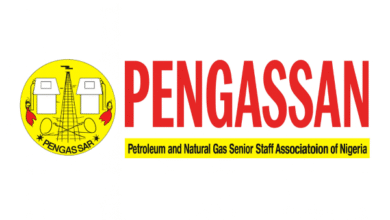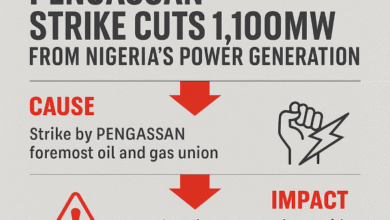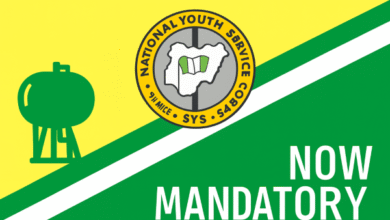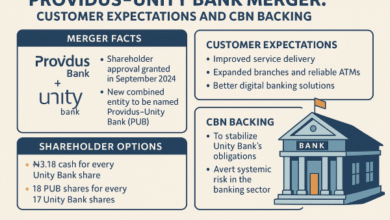PENGASSAN vs Dangote Refinery: Labour Strike or National Sabotage? The Battle That Could Reshape Nigeria’s Energy Future
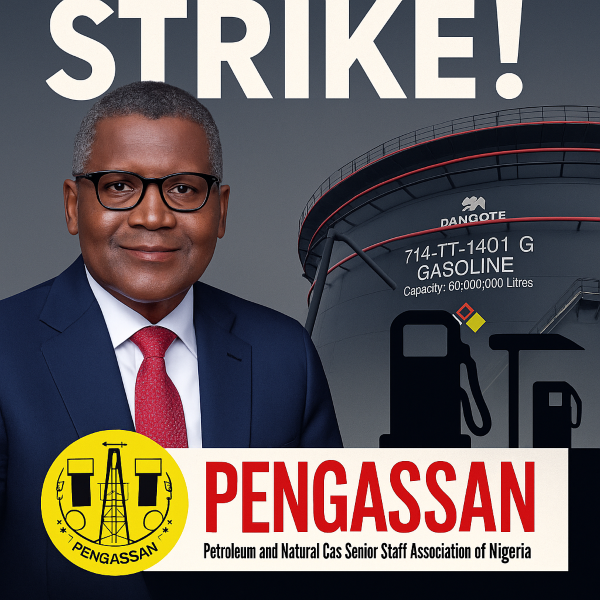
Strike at the Heart of Nigeria’s Oil Economy
Nigeria’s long-awaited industrial renaissance—anchored on the Dangote Petroleum Refinery, Africa’s largest single-train plant—has run into a storm. On Monday, the Petroleum and Natural Gas Senior Staff Association of Nigeria (PENGASSAN) executed a nationwide strike that ground operations at key oil and gas regulators: the Nigerian National Petroleum Company Limited (NNPCL), the Nigerian Upstream Petroleum Regulatory Commission (NUPRC), and the Nigerian Midstream and Downstream Petroleum Regulatory Authority (NMDPRA).
Gates were locked, offices shuttered, and the entire value chain was shaken. At the centre of the storm: allegations that Dangote Refinery wrongfully dismissed 800 Nigerian workers for belonging to PENGASSAN. The union declared total compliance, shutting down the refinery, cutting off fertiliser production, and disrupting crude and gas supply.
This strike is not just as a labour-management conflict but a stress test of Nigeria’s energy future, investor appeal, and economic stability.
The Federal Government has appealed for calm. Minister of Labour and Employment Muhammad Dingyadi urged both parties to withdraw threats and return to dialogue, warning that a strike in Nigeria’s most strategic sector could trigger revenue losses, energy insecurity, and social unrest.
Yet, the deeper question lingers: Is the PENGASSAN strike really a battle between PENGASSAN and Dangote Refinery—or a proxy war against Nigeria’s entire energy reform agenda?
Background: From Hope to Hostility
The Dangote Refinery was commissioned to end Nigeria’s dependence on imported petroleum products, conserve foreign exchange, and stabilise fuel supply chains. With a capacity of 650,000 barrels per day, the refinery was heralded as a game-changer for Africa’s largest economy.
However, labour tensions have brewed beneath the surface. PENGASSAN alleges mass sackings, discrimination against Nigerian workers, and anti-labour practices. Dangote Refinery counters that only a small reorganisation occurred, aimed at addressing sabotage and safety risks.
This dispute escalated into full-blown confrontation, with PENGASSAN shutting down installations nationwide and the refinery accusing the union of “economic sabotage.” The fallout is now threatening Nigeria’s energy stability, investor confidence, and national security.
The Key Issues
- Labour Rights: PENGASSAN frames the strike as a defence of workers’ constitutional and international rights to unionisation.
- Corporate Governance: Dangote Refinery insists operational efficiency and safety require decisive management actions.
- National Interest: The Federal Government sees the refinery as a strategic national asset—its disruption endangers energy security and fiscal stability.
- Public Perception: Nigerians fear a return to fuel queues, black markets, and inflationary pressure if refinery operations remain stalled.
Who is Right vs What Went Wrong?
- PENGASSAN’s Argument:
- Over 800 Nigerian workers allegedly sacked for union activity.
- Calls this a violation of labour laws and international conventions.
- Strike seen as a legitimate tool to resist anti-labour practices.
- Over 800 Nigerian workers allegedly sacked for union activity.
- Dangote Refinery’s Position:
- Denies mass layoffs; confirms targeted restructuring.
- Claims sabotage incidents threatened operational safety.
- Emphasises continued employment of 3,000+ Nigerians and new graduate trainee intakes.
- Denies mass layoffs; confirms targeted restructuring.
- Government’s Balancing Act:
- Caught between defending workers’ rights and protecting a project deemed essential for Nigeria’s economic future.
- Appeals for strike suspension to safeguard national interest.
- Caught between defending workers’ rights and protecting a project deemed essential for Nigeria’s economic future.
Sector-by-Sector Analysis
1️⃣ Oil & Gas
- Impact: Full shutdown of refinery stalls Nigeria’s hope of ending fuel imports.
- Risk: Crude disruptions and halted refining raise fears of fuel scarcity, black market profiteering, and subsidy resurgence.
2️⃣ Fertiliser & Agriculture
- Fertiliser Plant Train Two shut down. This risks supply disruptions for farmers, driving fertiliser costs up and worsening food inflation.
- Agriculture—already struggling with insecurity and climate shocks—may face a new input cost crisis.
3️⃣ Industrial Relations
- Nigeria’s ease-of-doing-business score could take a hit. Investors may see labour instability as a systemic risk to mega-projects.
- Questions loom: Can Nigeria host world-class projects without labour unrest undermining stability?
4️⃣ Manufacturing & Energy Transition
- Dangote Refinery is central to Nigeria’s industrial policy and AfCFTA strategy.
- Labour disputes risk slowing down Nigeria’s industrialisation agenda.
Investor Implications
- Equities: Energy-sector listed firms may see sentiment weaken if disruptions persist.
- FDI: Global investors may reconsider Nigeria as a safe hub for billion-dollar industrial projects.
- Bonds & Sovereign Risk: A prolonged strike could pressure Nigeria’s fiscal projections, feeding into debt market pricing.
- Private Capital: The refinery was built on private capital; labour unrest could deter future large-scale PPPs.
Economic Implications
- Inflationary Risks: Any fuel supply disruption risks a return to queues, panic buying, and higher transport costs.
- Revenue Losses: Government faces reduced crude earnings and increased subsidy pressures if imports spike.
- Exchange Rate Pressure: Forex demand for fuel imports could resurface, weakening naira stability.
- National Security: Energy disruptions exacerbate systemic risks at a time of economic fragility.
BRANDECONOMY Takeaways for Decision-Makers
- Labour Stability = Energy Security: Mega-projects must integrate robust labour engagement frameworks from inception.
- Balance Rights with Realities: Both union and management must prioritise dialogue; escalation risks hurting ordinary Nigerians the most.
- Investor Confidence is Fragile: Nigeria must demonstrate that labour disputes won’t derail strategic industrial investments.
- Policy Framework Needed: FG must establish a clear industrial dispute resolution framework for critical infrastructure projects.
Narrative Management: Transparent communication is critical. Perception that the refinery is unstable could undermine global investor trust.







